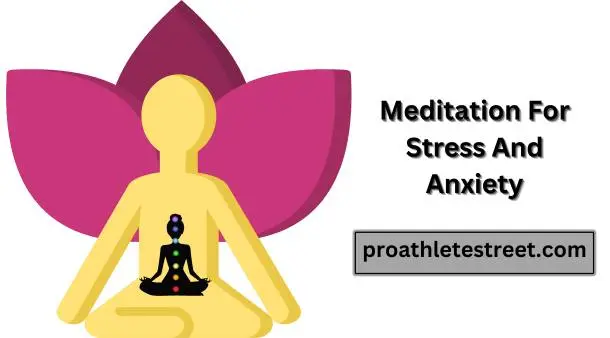Meditation For Stress And Anxiety

Meditation For Stress And Anxiety Yoga may help relieve tension and anxiety. Even a few minutes of meditation may relax you. Everyone can meditate. Easy and cheap. No special tools are needed either.Meditation is not restricted to one location. Walking, catching the bus, waiting in the doctor's office, or even during a professional meeting, you may focus.
What is Meditation For Stress And Anxiety
Meditation in the past was meant to help people understand the holy and mysterious forces of life better. These days, most people meditate to calm down and feel less stressed. Meditation is a type of alternative medicine for the mind and body. You can calm your mind and rest deeply by meditating.
You pay attention to one thing while you meditate. In this way, you stop the flow of thoughts that might be making you feel stressed. This process can help your mental and physical health.
Benefits of meditation
To feel calm, peaceful, and balanced, meditate. This can be good for your mental health and your general health. Focusing on something that makes you feel good can also help you relax and deal with worry. Meditation can teach you how to calm down and stay balanced.
These advantages don't go away when you stop meditating. You can feel more calm during the day if you meditate. Meditation may also help you deal with the signs of some health problems.
Read also: Loving Kindness Meditation into Your Daily Routine
Meditation and Being Healthy Mentally and Physically

You might get rid of the tons of information that pile up every day and make you stressed when you relax.
Meditation can help your body and mind in many ways, such as:
- Learn how to deal with your stress.
- Making you more aware of yourself.
- Keeping an eye on the moment.
- Getting rid of bad thoughts.
- Making you more creative.
- Making you more patient.
- Bringing down the heart rate at rest.
- Bringing down blood pressure at rest.
- Getting you to sleep better.
Meditation and illness
If you have a health problem, meditation might also help. The main time this is true is when you are stressed out and your health gets worse.It has been shown over and over that meditation is good for you. Some experts, though, say that there isn't enough proof that meditation works.
In light of this, some study shows that meditation may help people deal with the symptoms of conditions like
- Stress.
- Having asthma.
- Cancer.
- Long-term pain.
- Feeling down.
- Heart trouble.
- Too much blood pressure.
- Having irritable bowel syndrome.
- Not able to sleep.
- Headaches from stress.
If any of these or other health problems apply to you, you should talk to your doctor about the pros and cons of meditating. Meditation may sometimes make the signs of some mental illnesses worse.Meditation is not a replacement for medical care. But adding it to other medicines might help.
Read also: Loving Kindness Meditation into Your Daily Routine
Types Of Meditation
Meditation is a broad term for a lot of different ways to calm down. There are many kinds of meditation and ways to calm down that use some thoughts of meditation. Getting mental peace is what they all want.
Some ways to relax are:
-
Guided meditation. This can also be known as directed images or visualization. When you meditate this way, you picture places or things that help you calm down.
- Mantra meditation. This kind of meditation has you repeat a word, thought, or phrase that makes you feel calm to block out other thoughts.
-
Mindfulness meditation. Being aware is the key to this kind of meditation. This means paying more attention to the present.
-
Breath Awareness: One way to meditate is to just pay attention to your breathing. It works quickly and well to calm down when you're worried.
- Qigong. Most of the time, this practice includes breathing, movement, meditation, and relaxation routines to get and stay balanced.
Parts Of Meditation
There may be some things that help you relax that are unique to each type. These could be different based on who you follow or who is giving the class. These are some of the most usual things that happen during meditation:
-
Focused attention. One of the most important parts of meditation is focusing your mind.
- Relaxed breathing. For this method, you breathe deeply and evenly while using the diaphragm muscle, which is between your chest and belly, to make your lungs bigger. To breathe better, you should slow down, take in more air, and use less of your shoulder, neck, and upper chest muscles while you breathe.
-
A quiet setting. If you've never meditated before, it might help to be in a quiet place. Try to have fewer things that can confuse you, like no TV, computers, or cell phones.
- A comfortable position. There are many ways to meditate, such as while sitting, lying down, walking, or doing something else. As much as possible, try to be at ease so that you can meditate well.
Read also: A Step-by-Step Guide to Yoga Meditation for Beginners
How Meditation Helped Me with Stress and Anxiety

I was initially in doubt. How may something as basic as silent sitting change things? I decided to try it, still as I needed relief. Starting with a "10-minute meditation for stress and anxiety" video I came about online, The first several meetings were shocking, and my mind would stray nonstop. Still, I went on with it. I started to see slow changes. I felt more peaceful, my ideas were less unclear, and I responded less to stresses.
My Routine
One has to develop a meditation schedule. I created the practice of meditating first thing every morning before beginning my day. My regimen consisted like this:
- Find a Quiet Space: I arranged a little nook in my room with a cushion and different relaxing accents including candles.
- Choose a Guided Meditation: Often using "Guided meditation for anxiety and overthinking" programs accessible on YouTube or via apps like Calm and Headspace, I found
- Set a Timer: I built up to longer sessions starting with ten minutes. On very trying days, I would sometimes do a "1-hour guided meditation for stress and anxiety".
- Focus on Breathing: Closing my eyes, inhaling deeply, I would follow the guide's directions and let go of any judgment or annoyance when my thoughts strayed.
How Meditation Affects the Brain
- Reduces Stress Hormones: Meditation minimizes the cortisol generation, the hormone inducing stress.
- Enhances Focus and Attention: Regular practice helps the mind remain present and enhances focus.
- Improves Emotional Health: Meditating boosts the synthesis of serotonin, the "feel-good" hormone that could fight anxiety and depression.
My Favorite Guided Meditations
- "10-minute meditation for stress and anxiety": Great for a midday fast reset.
- "1-hour guided meditation for stress and anxiety": Perfect for quiet time and relaxation following a demanding day.
- Guided Images: These let me let go of fears and picture serene settings.
Read also: How to Practice Transcendental Meditation
Common Challenges and How to Overcome Them
Challenge: Restless Mind
My thoughts was flitting about when I started. To sit still and focus seemed difficult. I discovered over time that this is really typical. The secret is to remain patient and constantly refocusing on your breath or the voice of the guide.
Challenge: Making Time
Finding time to meditate can be difficult, even with a hectic schedule. I meditated during lunch breaks or started rising ten minutes earlier. It evolved into a non-negotiable habit finally.
Challenge: Doubt and Skepticism
Often, I worried if meditation was actually helping or if I was simply waste time. Every time I missed a session, though, I felt different and had different stress levels. Keeping motivation and tracking my growth helped me by means of a diary of my meditation experiences.
Long-Term Impact of Meditation on My Life

Though it's not a miraculous fix, meditation is a great tool for me to better control anxiety and stress. Like eating right and working exercise, it's evolved into a regular component of my self-care schedule over time. Beyond the meditation itself, the advantages shape my attitude to problems, relationships, and personal care.
Forming a Strong Mind Attachment
Among the most notable improvements I have observed is my resilience. Though they sometimes arise, stressful events don't cause me the same kind of imbalance as they did. Thanks to meditation, I have come to face difficulties with a calmer attitude and a clearer mind.
Continuous Improvement
One should engage in meditation lifetime. I find days when it's difficult to calm my thoughts even after years of meditation. Still, that's good. The aim is growth rather than perfection. Every session, no matter the length or difficulty, advances a more balanced and healthy attitude.
How to meditate in everyday life.
Do not let the thought of relaxing the "right" way make you feel more stressed. You can choose to go to meditation places or classes with trained teachers if you want to. However, it's easy to meditate by yourself as well. You can also use apps.
For that matter, you can be as serious or casual as you want when you meditate. Some people make it a habit to meditate every day. One thing they might do is meditate for an hour every morning and night. There's no need for a lot of time to meditate, though.
-
Breathe deeply. Breathing is a normal process, so this is good for newbies.
-
Scan your body. Pay attention to every part of your body as you do this method. Pay attention to how your body feels. That could be pain, stress, warmth, or ease.You can come up with
- Repeat a mantra. It's good for you to relax by meditating while you walk. This method can be used anywhere you're going, like in the woods, on a city path, or at the mall.
-
Walk and meditate. People all over the world know and use prayer as a form of meditation. A lot of faiths have both spoken and written prayers.
-
Read and reflect. Some people say that reading songs or religious texts and then taking a moment to think about what they mean helps them.
- Focus your love and kindness. When you do this kind of meditation, you think of other people with love, respect, and kindness. This might help you feel closer to other people.
Read also: 5 Science-Based Benefits of Meditation
Conclusion: Start Your Own Journey with Meditation
If worry and anxiety bring you down, I advise you to try meditation. This is a basic habit with serious results. Starting with a "meditation for stress and anxiety" or digging into a "1-hour guided meditation for stress and anxiety," there is no right or wrong approach. Starting and staying with it is highly important. Your mind—and your well-being—will honor you.
Remember that meditation is a personal journey. Go one step at a time, be kind with yourself, and explore different options until you find what suits you best. Inner peace is but a breath away.
FAQ's Meditation For Stress And Anxiety
How to treat chronic stress and anxiety?
- Working out.
- Getting enough good food.
- Learning how to organize your time well.
- Set goals that are attainable.
- Getting more sleep.
- Making time for fun things to do.
- Getting better at dealing with stress.
How to lower stress and anxiety?
- Enjoy your food. Diseases linked to food will be less likely to happen if you eat well.
- Pay attention to how much you smoke and drink.
- Do some exercise.
- Take a break.
- Pay attention.
- Get a good night's sleep.
- Take it easy on yourself.
Can meditation stop anxiety attacks?
Meditation can really help you deal with panic attacks, whether you're having one or just want to lower your stress and make them less likely to happen in the first place. But it's important to remember that meditation is only one way to deal with your worry and panic.
What is the 3-3-3 rule for anxiety?
It basically calls on you to name three objects you can see, three objects you can hear, and three ways you may move your body. Aimee Daramus, PsyD, a clinical psychologist at Clarity Clinic, Chicago, says "it's basically a way of distracting yourself from your anxiety by shifting your attention to your senses."
What is the 5 5 5 rule for anxiety?
The five five five rule is the one whereby you inhale deeply for five seconds, hold the breath for five seconds, then exhale for five seconds. Then list five objects you could touch, five noises you could hear, and five things you could see.
What is the 80 20 rule anxiety?
The 80/20 rule tells us that around 80% of your tension and anxiety comes from roughly 20% of your stresses. From job strain and money concerns to marital problems or health difficulties, these stresses might vary.
What is the 5 minute rule for overthinking?
Breaking out of a worry spiral requires this. How it functions: Stop and consider whether what you are worrying about will be relevant in five years. Should the response be positive, keep on. If the response is no, though, allow five minutes to worry before continuing.
What is the 10 second rule for anxiety?
Give yourself time to react in a sensible manner even under trying circumstances. The 10-second rule is really easy to understand: stop for 10 seconds before answering anytime the temperature in a discussion starts to rise. That's it—just stop and wait.





